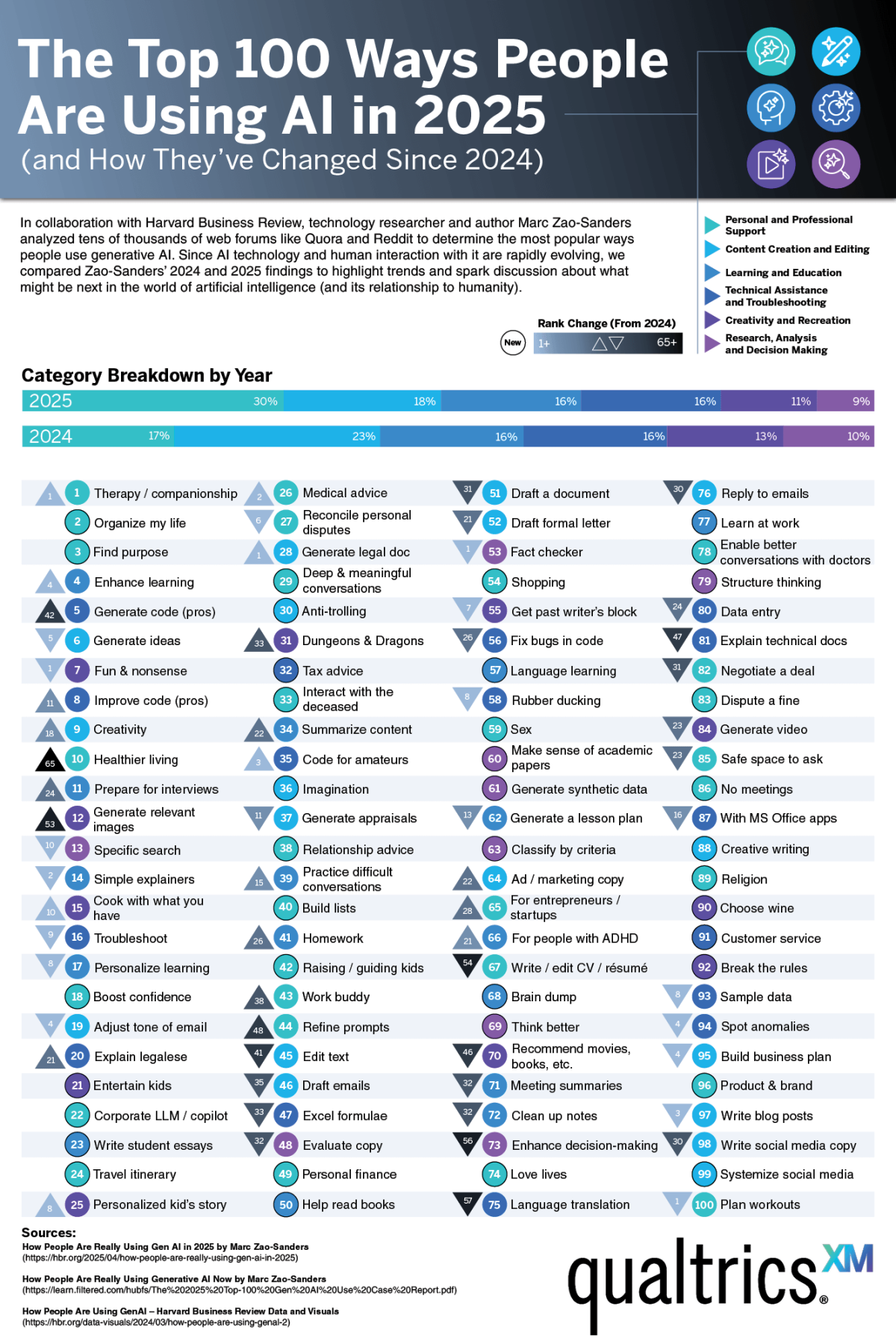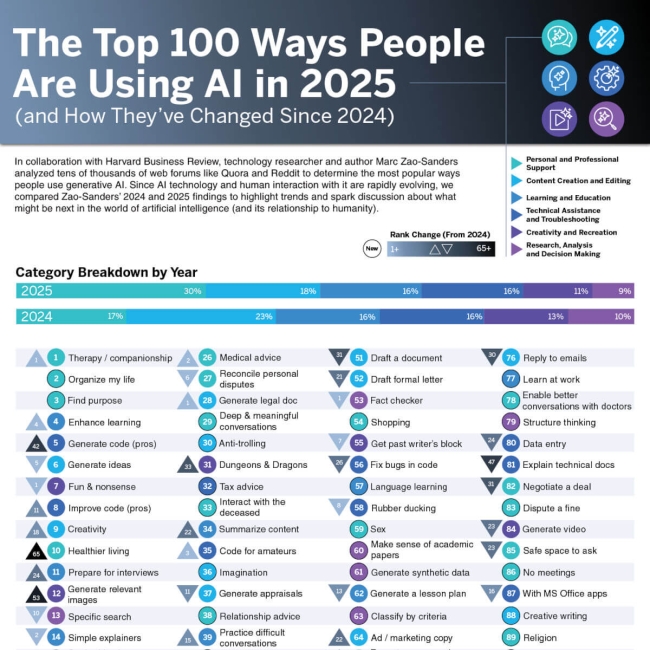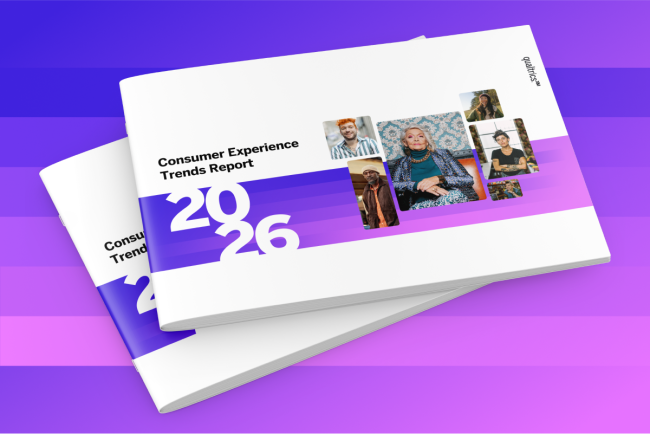As AI continues to improve and evolve, more and more people are finding ways to incorporate it into their workflows, businesses and daily lives. In just a few short years, AI has gone from the simple systems that helped us autocomplete search queries or organize our inboxes to tools that can offer advice, shape creative projects and help us make sense of complex information. In what feels like the blink of an eye, AI has become a part of our daily lives.
Whether serving as inspiration, organizing data or even providing emotional support, people find creative, thoughtful and sometimes unexpected ways to bring AI into their everyday routines. Interestingly, as these systems continue to improve and grow in popularity, our reasons for turning to them have also shifted.
Today, Qualtrics is looking at data from Harvard Business Review to learn more about the emerging patterns in how people interact with AI.

Copy and paste the code below to use the infographic on your own website or blog<a href="https://www.qualtrics.com/sites/default/files/styles/standard_xl/public/migrations/content/AI-uses-2025-1.png.webp?itok=GJAmEGm6"><img src="https://www.qualtrics.com/sites/default/files/styles/standard_xl/public/migrations/content/AI-uses-2025-1.png.webp?itok=GJAmEGm6" alt="The Top 100 Ways People Are Using AI in 2025 - Qualtrics Customer Experience - Infographic" title="The Top 100 Ways People Are Using AI in 2025 - Qualtrics Customer Experience - Infographic"></a><br><a href="https://www.Qualtrics.com" alt="Qualtrics Customer Experience" title="Qualtrics.com">By Qualtrics.com</a>
How Does AI Work?
Before getting into the who, what and why, it helps to understand the "how."
Unlike the sentient characters from science fiction, generative AI systems are not self-aware. They don't think, feel or make decisions like humans do. Instead, they generate responses based on enormous amounts of data they've been trained on. When you type a question or prompt into a tool like ChatGPT or Midjourney, the AI predicts what to say next by identifying patterns in the information it has seen before.
Because AI systems are built on probability and prediction, they can produce fluent and often helpful responses, but at the end of the day, they are really only mimicking human language and behavior.
However, they can be incredibly useful for tasks that involve structure, repetition or large sets of information, like text summaries, coding and pattern recognition. Even then, despite AI being fast, flexible and useful for a variety of tasks, it has its limits.
For example, many generative AI models will spout out confident-sounding, yet completely false or heavily biased answers. Like any new technology, AI is a tool, and one that works best alongside an actual human who can fact-check and guide it. All of this impacts the usefulness of AI and how it's being used.
With that in mind, let's take a look at the ways people are using AI today.
Six Main Categories of AI Use in 2025
Based on the research by Marc Zao-Sanders in collaboration with Harvard Business Review, there are six main categories of how people are using generative AI:
Personal and Professional Support
- 30%(up from 17% in 2024)
Content Creation and Editing
- 18%(down from 23% in 2024)
Learning and Education
- 16%(steady from 2024)
Technical Assistance and Troubleshooting
- 16%(steady from 2024)
Creativity and Recreation
- 11%(down from 13% in 2024)
Research, Analysis and Decision Making
- 9%(down from 10% in 2024)
Personal and Professional Support (30%)
This was the fastest-growing category, nearly doubling from 17% in 2024 to 30% in 2025. People use AI to organize their lives, manage their time, get help preparing for job interviews, plan workouts, navigate parenting challenges and even talk through emotional situations. New uses include exploring purpose, improving confidence and even simulating conversations with lost loved ones.
Content Creation and Editing (18%)
Although usage here declined slightly from 23% to 18%, this is still one of the top ways AI is used. Individuals rely on generative tools to draft emails, brainstorm ad copy, build business plans and more. New tasks include refining tone, structuring posts for social media and experimenting with creative writing. Interestingly, the biggest drops came from traditional tasks like editing text and replying to emails, which may point to users shifting their attention toward more creative or strategic work.
Learning and Education (16%)
Learning has held steady year over year, with AI being used to personalize study plans, simplify complex ideas, practice for difficult conversations and even support neurodiverse learning styles. It also helps with homework, reading comprehension and acting as a private tutor in subjects ranging from math to language acquisition.
Technical Assistance and Troubleshooting (16%)
Another steady-use category, this includes generating and improving code, explaining technical documents and automating repetitive IT tasks. New use cases in 2025 include debugging and helping users navigate tools like Microsoft Office more effectively. Although some legacy tasks like writing Excel formulas have declined, technical professionals are finding new ways to lean on AI to accelerate their work.
Creativity and Recreation (11%)
This category has dipped slightly, and includes things like writing custom bedtime stories, planning games like Dungeons & Dragons and sparking creative thought. New uses also include exploring art ideas, making cooking decisions based on what's in the fridge and generating music or video content.
Research, Analysis and Decision Making (9%)
While it saw a small decrease, this area remains significant as users continue to turn to AI to help summarize research papers, structure their thinking or spot anomalies in data. AI has proven to be very helpful in filtering overwhelming information as well as in supporting faster, more confident decision-making, though it would seem people better understand that human judgment is still necessary in these cases.
Rather than just focusing on what people are using AI for, the changes in its use can tell us how AI is evolving alongside society. As people get more comfortable with the tools, they learn when and where it shines versus where a human touch is better suited. For example, the spikes in tasks like enhancing learning, generating images, preparing for interviews or exploring healthier living point to growing trust in AI as a personal assistant for daily tasks. Meanwhile, drops in email editing, Excel formulas and code debugging suggest that while AI is still useful in these areas, people might find it doesn't save them as much time or effort as they once thought.
At the end of the day, it's clear that the way we use AI is constantly evolving because we, as people, are evolving. What matters most is that these tools serve human goals by speeding up our mundane tasks and finding patterns we might otherwise have missed. When used wisely, AI can save time, spark ideas and expand access to support and learning.
Qualtrics is here to help organizations make sense of how AI is reshaping the playing field. By collecting, analyzing and acting on data related to employee, product and customer experiences, we help companies utilize AI to connect better with the people they serve. Contact us today to explore how Qualtrics can help you move from information to action.
Sources
- How People Are Really Using Gen AI in 2025 by Marc Zao-Sanders
- How People Are Really Using Generative AI Now by Marc Zao-Sanders
- How People Are Using GenAI -- Harvard Business Review Data & Visuals



